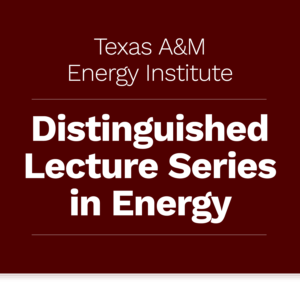
Increased Oil and Natural Gas Production, Methane Emissions, and Climate
The Texas A&M Energy Institute’s Distinguished Lecture Series in Energy will feature Dr. David Allen, the Norbert Dittrich-Welch Chair in Chemical Engineering and a Professor of Chemical Engineering at The University of Texas at Austin, on Wednesday, January 15, 2025, from 11:00 a.m. – 12:00 p.m. CST (UTC -6:00). The topic will be “Increased Oil and Natural Gas Production, Methane Emissions, and Climate.”
Abstract
Hydrocarbon products derived from horizontal drilling and hydraulic fracturing of shale formations (shale gas and shale oil) have greatly expanded US oil and natural gas production, and have made the US the world’s largest natural gas and petroleum producer. Collectively, these resources have transformed North America’s energy landscape. However, the environmental impacts associated with ‘‘fracking’’ for shale gas and oil have made the process controversial. This presentation will focus on one of the environmental issues associated with shale gas and oil production: the emissions of methane, a potent greenhouse gas. Data from recent field studies will be summarized and the role of “super-emitting” sources will be described. Super-emitting sources are often due to equipment malfunction, so quickly identifying and repairing these sources can significantly reduce emissions. The potential role of multi-scale emission measurements in identifying super-emitting sources will be described and the design and deployment of multi-scale methane emission measurement networks will be discussed.
Biography
Dr. David Allen is the Norbert Dittrich-Welch Chair in Chemical Engineering, and the Director of the Center for Energy and Environmental Resources, at the University of Texas at Austin. He is the author of seven books and over 300 papers, primarily in the areas of air quality and energy systems. Dr. Allen has been a lead investigator for multiple air quality measurement studies, including studies of emissions from unconventional oil and gas development. The quality of his work has been recognized by the National Science Foundation, the AT&T Foundation, the American Institute of Chemical Engineers, the Association of Environmental Engineering and Science Professors, and the State of Texas. In 2017, he was elected to the National Academy of Engineering. In 2020, he was recognized with the ENI Energy Transition Award, which has been referred to as the Nobel Prize in energy. He has served on a variety of governmental advisory panels and committees and boards of the US National Academies of Science, Engineering and Medicine. From 2012 to 2015 he chaired the U.S. Environmental Protection Agency’s Science Advisory Board (SAB) and he currently serves on the SAB. He was also part of the National Petroleum Council committee that responded to the Secretary of Energy’s request for information on greenhouse gas emissions from natural gas systems. He has held visiting faculty appointments at the California Institute of Technology, the National University of Singapore, the University of California, Santa Barbara, and the Department of Energy National Energy Technology Laboratory in Pittsburgh.
